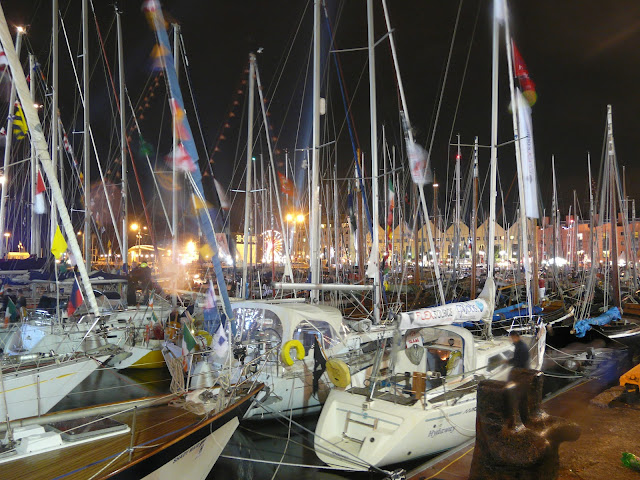I've been in Galway, Ireland for two months
now due to a scientific collaboration among my lab at Scripps Institution of
Oceanography in San Diego, NIBEC at the University of Ulster, and the School of
Physics at the National University of Ireland, Galway. We're preparing for a
scientific expedition to the sub-tropical Atlantic, leaving a volcano in the
archipelago of the Canary Islands (Spain) and landing on a volcano a few
thousand kilometers north in the archipelago of the Azores (Portugal). We'll be
at sea for exactly one month, studying the chemical properties of the ocean
over which we pass.
I'm a chemical oceanographer. I am part of a
team inventing a sensor designed to measure dissolved carbon dioxide in
seawater. Carbon dioxide is increasingly well known and discussed due to its
role as a greenhouse gas: a molecule which helps to keep heat inside of our
atmosphere. Without CO2, the planet would be drastically colder; some CO2 is
needed for life as we need it. However, we're now drastically altering natural
cycles. The additional CO2 in the atmosphere largely comes from fossil fuels
which took eons to be created and trapped below the Earth's surface. We're now
extremely efficient at sucking it up from below the surface, using it for quite
a few different purposes, and, in the process, putting it into the atmosphere
in the form of carbon dioxide gas. It's not novel to have CO2 in the atmosphere,
or even to have very high concentrations of it there, but it is at the very
least worth considering the celerity at which which humans have managed to
alter nature (day-by-day, year-by-year, century-by-century), especially when
compared to the speed at which nature alters nature (day-by-day can happen,
sure, but most changes of comparable magnitude take tens of thousands up to
tens of millions of years).
I started this post talking about
oceanography and seemingly became distracted by atmospheric chemistry. I
strongly believe that it's critical to understand a bit about the atmosphere to
know the rationale for what I do. Approximately one-third of the carbon dioxide
released into the atmosphere (I'll do my best to keep my facts straight here;
if I'm wrong in speaking about specific numbers, it was an honest mistake) ends
up dissolving into seawater. While this is good at buffering atmospheric
climate change (AKA global warming), it has its own deleterious effects on the
ocean.
When carbon dioxide dissolves in water, it
creates an acid (specifically, carbonic acid). This is called ocean acidification. The resultant shift in chemical
balances causes some life-critical molecules to be in shorter supply in the
ocean. For example, some shell-building organisms have a much harder time finding
a principal component of their shells, making it harder for them to protect
themselves, survive, and reproduce. Remember the experiment that most of us did
or at least learned about in elementary school where we saw a tooth dissolve in
soda? That experiment has a lot in common with what we're doing to the oceans
now. The tooth in the soda and the creatures in the ocean both dissolve due to
higher levels of acidity than they're evolutionarily designed to handle.
If we already know that this is happening,
then, why is it worth my time to invent a new sensor to detect dissolved carbon
dioxide levels? That's a great question, one which I hear quite frequently, and
for good reason. I think it's important for all scientists (in fact, anyone
with a job, from students up through CEOs, presidents, professional athletes) to ask
themselves regularly why they do what they do. In finding the answer to this,
we are able to motivate ourselves to do our jobs far better. For me, the answer
in its shortest version that I can manage is the following... While we know it
is happening largely from data collected by retrieving water samples from all
over the world and analyzing them on a ship or back in land-based labs, it is
very difficult, time consuming, and expensive to bring ships all over the world
to collect measurements and impossible to do it with high regularity. A sensor
that could be left out in the ocean to drift around, float up and down, collect
carbon dioxide data, and send it back through satellites to labs on land would
drastically improve our understanding of how we're altering the global chemical
environment. Information like this will in turn help to inform biologists how
organisms are responding so that we can track ecosystem health and, ideally,
manage ourselves accordingly.
I spend the bulk of my time trying to make
various components of this sensor operate correctly. There are quite a few
electrical signals that are used to control the sensor, measure the
characteristics of the seawater, and record the data. All of this work is quite
new to me; despite my background in chemical engineering, actually engineering
a chemical sensor is an entirely unique process.
While this novelty makes it challenging, it also makes it quite manageable and
rewarding because I know that only hard work will make the device function
correctly.
I also spend a significant amount of time
testing the sensors that I build. This frequently takes me out to beautiful and
peaceful remote places in the ocean for long periods of time. I am leaving for
a cruise in just a few days and will undoubtedly have plenty to share about my
experiences at sea.
Written August 2012



